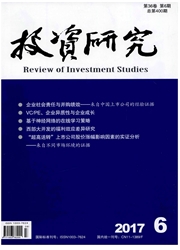

 中文摘要:
中文摘要:
本文试图通过个人投资者的“赌性”——博彩偏好来解释我国IPO的诸多异象,即上市首日暴涨;长期收益反转;换手率超高等。基于累积前景理论,本文从理论上阐述并从实证上验证了博彩偏好对IPO首日暴涨和长期收益反转有着显著的影响。以我国证券市场2009-2012年所有发行新股作为研究样本,实证结果表明博彩偏好每增加一个标准差,首日涨幅显著提高5.5%,并且当市场环境较好时,投资者的乐观情绪会使博彩偏好的效应增强。从长期来看,博彩偏好越强的公司,长期风险溢酬为负,机构投资者继续持有新股的可能性越低。
 英文摘要:
英文摘要:
In this paper, we investigate many anomalies in IPOs, concluding huge initial return, long-term return reversal, high turnover rate from the perspective of investors' desire to gamble--skewness preferences. Based on cumulative prospect theory, this paper theoretically and empirically verified that there is a significant impact on the first day and the long-term returns. Us- ing all issue of new shares between 2009 and 2012 as a study sample, the empirical results show that the increase of a stan- dard deviation of skewness preference, the first day returns increase 5.5%. Besides when the market environment is favorable, the positive sentiment of investors will make the effect of skewness preferences stronger. In the long run, the stronger the ex- pected skewness is, the more negative the long-term risk premium is, the lower the possibility of new shares that institutional investors continue to hold.
 同期刊论文项目
同期刊论文项目
 同项目期刊论文
同项目期刊论文
 期刊信息
期刊信息
